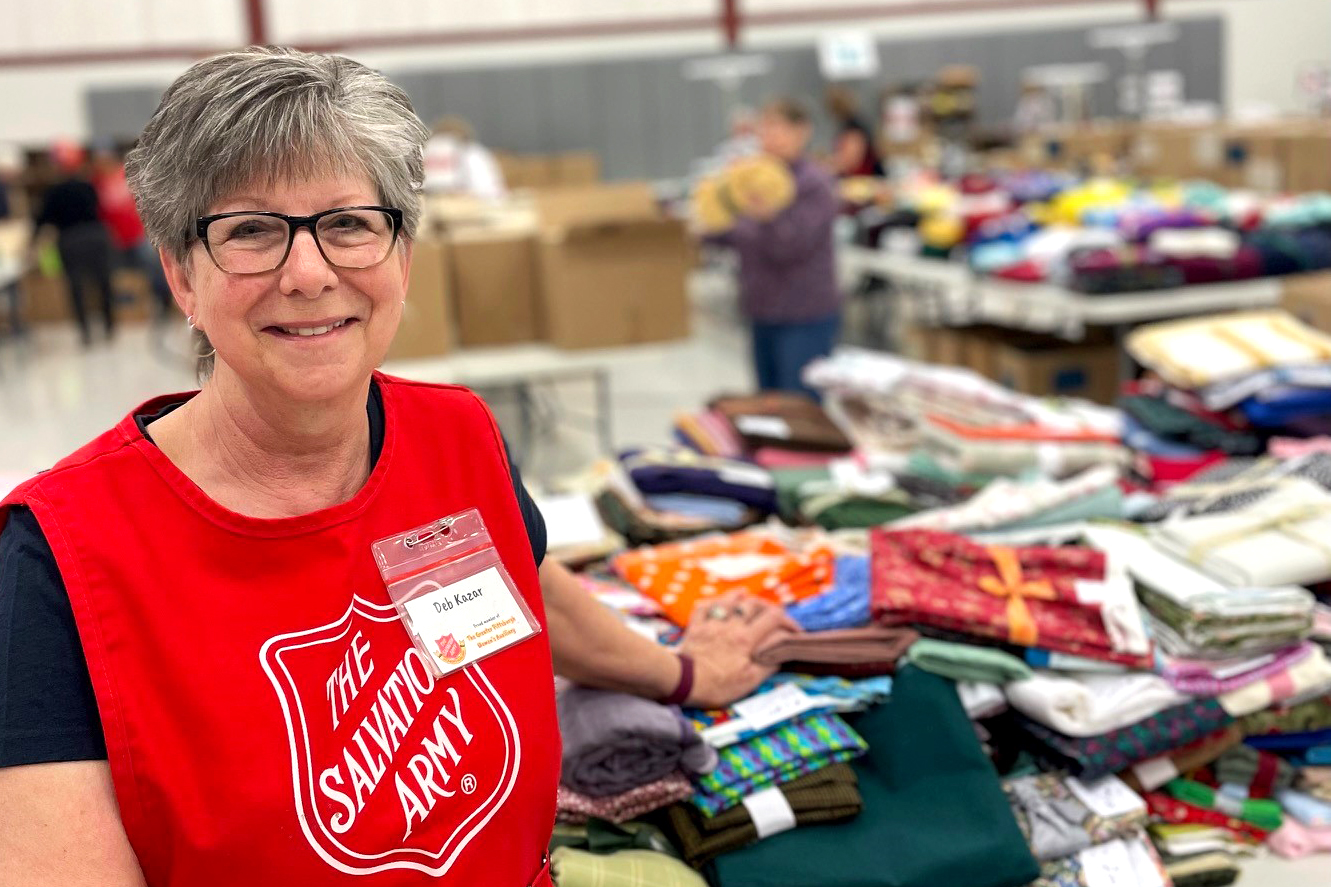Deborah Kazar
by Hugo Bravo

“We’ve thought about turning the Fabric Fair into a whole weekend event, or maybe charging a fee to have early access to our products,” says Deborah Kazar. “But that would require our volunteers to be here an extra day or two. These are women in their 70s and 80s, and they’re already working hard year-round to make that one day of the fair into a big success.”
It takes place just two days per year, once in the spring and again in the fall. But Deborah Kazar knows that the Fabric Fair is a year-round ministry for her and other volunteers with The Salvation Army Greater Pittsburgh Women’s Auxiliary.
“The Fabric Fair was my introduction to The Salvation Army,” says Deborah, who is vice president of the Greater Pittsburgh Women’s Auxiliary. “I make purses and go to many fairs like this for material. But here, they asked me if I wanted to volunteer, and so I started coming on Wednesdays to help The Salvation Army.”
Since its inception over 30 years ago, the Fabric Fair has raised nearly $750,000 for The Salvation Army to help individuals and families in Allegheny County, Pa.
Throughout the year, the Women’s Auxiliary collects fabrics, buttons, zippers, and more, organizes the logistics, and promotes the fair over social media. Items are sold at a fraction of their cost at large stores. It’s a ministry dependent on both the donations it receives and the work of its volunteers. They do everything from labeling boxes of supplies to watching videos on how to fix old sewing machines to make them usable again and salable at a profit.
Deborah arrived at the Fabric Fair just as its chairperson of 15 years retired. None of the fair’s numbers or procedures were written down because the chairperson had memorized all the information.
“When we received pallets full of fabrics that needed to be measured, there was no system for organizing what we got,” Deborah says. “We were still using old baby scales for weighing materials and doing the pricing with pen and paper. It was time to move on to digital tools that did the pricing for us.”
As a U.S. Army veteran and former schoolteacher, Deborah knew that better structure and order would lead to better results. Changes ranged from tweaking how they showed off products, like displaying zippers on hangers rather than in boxes, to buying tools to make handling fabrics easier.
“We bought a fabric roller from Grand Rapids, Mich.,” says Deborah. “It was originally used in Detroit car factories for the interior fabrics. The Salvation Army in Michigan bought it for themselves, and when they had no use for it, they sold it to a couple that also worked in fabrics. We bought it from them.”
To store its merchandise, the Women’s Auxiliary shares space at a warehouse with the Army’s Western Pennsylvania Division Emergency Disaster Services (EDS). Deborah and other Women’s Auxiliary members also volunteer to prepare food on Tuesdays, when the EDS canteen goes out to feed Pittsburgh’s unhoused community.
The warehouse facility has a small modeling room where the women can take pictures of products to post on social media. They split the cost of display tables with the local Salvation Army summer camp. Sharing is never a problem; the fair and the camp use the tables at different times of year. In turn, if the camp needs curtains for cabins or tablecloths for its dining room, they are welcome to come and find materials.
“Nothing goes to waste. Even scraps of fabric too small to sell go to people that make supplies for pets,” says Deborah. “We’ve met folks from charities that make clothing and purses for others. One group buys fabrics to sew menstrual pads for women in poor parts of the world, where those hygiene products are expensive or difficult to find.”
A new, younger generation—familiar with websites like Etsy and starting home businesses—is embracing sewing and other handicrafts, and the fair is a great resource for them. High school theater clubs with limited funds know that at The Salvation Army, they can afford supplies for costumes and backgrounds. Local fashion designers and models come to find materials for their next runway show. They don’t have to wait to get what they need; some even take the time to volunteer at the warehouse.
“College kids today are crocheting, sewing, and scrapbooking!” says Deborah. “For them, our Fabric Fair ministry is their introduction to what The Salvation Army does, as it was for me.”

